There is an old African story about a hummingbird and a jungle fire. It is told that a great fire started in the jungle, and all the animals fled from the jungle and crossed a river to safety. As they all watched the fire burn, they moaned and cried for the loss of their jungle and their homes. However, a hummingbird decided to try and do something; it flew to the river, collected a few drops of water in its beak, and flew to the fire to drop the water onto it. The hummingbird did this over and over again, while all the other animals watched in disbelief and said “Don’t bother, you’re not making a difference. You’re too tiny, your wings may get burned, you’re only bringing a few drops. There’s no point!” Finally, an animal asked the hummingbird “What do you think you’re doing?” The hummingbird replied, “I am doing the best that I can.”
This story is a simple yet powerful one; no matter how overwhelming the situation, there is always something you can do to help. No matter how insignificant the act may seem, at least action is being done to help. After spending the last seven days in the Kenyan bush in Baringo County, hosting the first-ever Peace Camp for Ilchamus and Pokot children, I know this story rings true for the work and the mission of Children Peace Initiative (CPI) Kenya; despite being an organization of only six people, they are working towards putting out the “jungle fire” of conflict between the warring pastoralist communities in Northern Kenya.
This past week has been impactful, inspirational, and also very hard; not just in the sense of struggling through the challenges that the Kenyan bush throws at you (no running water or toilets, no electricity, impassable roads, scorching hot days and very cold nights, and limited food, to name a few) but also emotionally. This week I witnessed first-hand the impact of conflict on communities and specifically on children, and was confronted head-on with the privileged upbringing I had compared to what these 256 Pokot and Ilchamus children face every day. Yet despite the struggles these children have endured, they are still happy, and they are still determined to bring peace to their communities. They want their voices to be heard. They want peace. And they want a chance to succeed.
I’ll start from the beginning. On Monday, 25 June we set out from Nairobi for Baringo County. Baringo County is named after Lake Baringo, and hosts the Pokot, Ilchamus, Tugen, and Kikuyu tribes. It has one of the highest illiteracy rates in Kenya, the average family lives on $2USD a day, only 16% of the population has a high school education or higher, and the vast majority of families are pastoralists (livestock keepers). To read more about Baringo County, click here.
We arrived in the town of Marigat (140 miles north of Nairobi) around 10pm, and set out for final logistics meetings and errands on Tuesday the 26th. I have heard the expression before that “the road to peace is never easy” and this proved true in the most literal way – while attempting to drive to one of the schools that was sending Ilchamus students to our Peace Camp, we got stuck in a mud pit less than 4km away from the school! With the help of local villagers, we had our Toyota Landcruiser 4×4 towed out of the pit by a tractor, and after crossing another river we finally arrived at the school to meet with the Headmaster.
Check out the video of us getting towed out!
After meeting with the headmaster, around 8pm we started driving back to Marigat. However, this time we faced another obstacle – the water levels of the river we crossed to get to the school had increased dramatically over the last few hours due to heavy rains, and it was now impassable. We decided to park and wait a few hours to see if the water levels went down, and sure enough, by 11pm we were able to cross. To say that there were a few prayers being said as we crossed that river is the understatement of the year! Finally, after getting back to Marigat around 12:30am, we tucked in for one final night of sleeping in an area with beds, running water, and electricity.
Watch the video of us crossing the river during daylight!
On Wednesday, June 27th we bought all the food for the Peace Camp (shopping for food to cook over 1,300 meals during Peace Camp is no joke!) and finally loaded up to make the final 1.5-hour drive to Chepkalacha, the small bush village where we were hosting the Peace Camp. After being on the road (road = rocky dirt path) for about 45 minutes, we heard a loud “HISSSSSSSSSS” and sure enough, the right rear tire had popped. Like I said, the road to peace is not easy! After a quick tire change, handled masterfully by CPI Kenya’s driver and logistician Francis, we finally made it to Chepkalacha. Begin, Peace Camp.
As I’ve written before, Peace Camp is the first stage of the peacebuilding work that CPI Kenya does amongst warring communities. They bring children in grades 5 and 6 together from two conflicting tribes and teach them how the friendships they make at Peace Camp have the power to transform their communities and bring peace to their tribes. If the children and families successfully maintain their friendships and foster peace between the two tribes, then after 2 years’ time they are gifted a shared heifer through CPI’s Heifers for Peace program.
This Peace Camp was held for Pokot and Ilchamus children from seven different schools, all of which have been affected because the two tribes have been in conflict since 2005. Before 2005, they had lived peacefully together in Baringo County. However, after a significant drought in 2005, a group of Pokot thieves (they are typically called “warriors” but I feel it’s important to call them what they really are – thieves) raided Ilchamus villages for their cattle, and there has been conflict and mistrust ever since. Conflict disrupts everything; many children at the Peace Camp had to drop out of school for years because it was too dangerous to go to school, they were forced from their homes and are still Internally Displaced Peoples (IDP’s), and for most of them, their whole lives had been lived in conflict. For all 256 children, this was the first time they had ever spoken to a member of the other tribe.
We kicked off Peace Camp Thursday morning, June 28th and told the kids what they were here for: to bring peace to their communities. We tasked them with making a friend from the other tribe, and asked if any had already done this. Shockingly, about 40 kids stood up; after less than 12 hours, inter-tribal friendships had already started forming. Emotions flooded through me as these new friends bravely stood up in front of the other kids, nervously holding each other’s hands and looking to see what the reaction was from their fellow tribe members. We applauded their braveness and encouraged the other children to follow their example, and from there we started the various team building games and activities planned for Peace Camp.
Over the next three days, we led the children through discussions about forgiveness, peace, and reconciliation. We played sports, we sang songs, we had silly interactions, and we had simulations of inter-tribal interactions and harmony. The transformation that took over the children was tangible and strong; seeing two Pokot and Ilchamus girls walk hand-in-hand to the river to wash their clothes, or to see two Pokot and Ilchamus boys share their food with each other was inspiring. To witness how, despite the hardships they have endured because of the wars of their tribes, they still accepted each other and wanted to be friends with each other was a lesson that could be learned by so many.
Watch this beautiful video of the children singing and dancing!
The new friendships and interactions have already started to impact the two communities. A teacher who accompanied her students from an Ilchamus school told me that the first two days of Peace Camp she fielded about 40 phone calls from the parents of her students, asking “Is my son/daughter okay? Are they safe? How are the Pokot treating them?” The teacher assured the parents that the children were safe, that they had been warmly welcomed, and that they were interacting and enjoying being with the Pokot children. After the first two days, she said the calls had stopped; word had already spread to the entire Ilchamus village that changes were happening between the Pokot and Ilchamus.
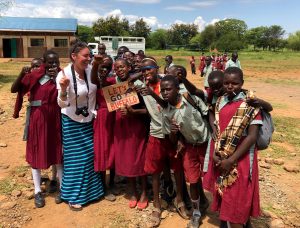
Having fun with the kids and teaching them about my favorite American football team, the Buffalo Bills!!
The next step in the peacebuilding process is the Holiday Exchange activity. Next month during the school holiday, all 256 Ilchamus and Pokot children will be hosted at an Ilchamus school (since the Peace Camp was held at a Pokot school). This solidifies the friendships that were made at the Peace Camp, and offers the chance for both tribes to host the children. Although the Ilchamus community was originally afraid to host the Holiday Exchange, the teachers, pastors, and children have all stated how they are now excited to host the Pokot children and look forward to giving them a warm “Karibu Sana”.
Above is a picture of a Pokot girl named Sheila. During an interview by CPI Kenya staff, she began to cry and revealed that in 2010 her mother was killed in a cattle raid by Ilchamus raiders. Despite this, she still came to the Peace Camp with an open heart and mind, willing to make Ilchamus friends and wanting to be an ambassador for peace within her community. As I asked to take her photo, she shyly smiled and said “For America? Okay!” She also said she can’t wait to see her Ilchamus friend again next month, and that she wants peace for her country that she loves.
Above is a picture of Haron, a Pokot boy, and Shadrack, an Ilchamus boy. They were two of the kids that stood up on Thursday morning to say they had already made a new friend from the other tribe. Haron is from Chepkalacha, and Saturday evening he ran home to tell his family about his new Ilchamus friend. He returned to Peace Camp with 12 ears of corn, to give to Shadrack for him and his family as a gift and peace offering. To pastoralist families like Haron’s, giving away 12 ears of corn is a large sacrifice to make, and it signifies how badly these families want peace between their two communities. Without peace camp, friendships and reconciliation like this would never happen. Acts of kindness between the two communities haven’t happened since the conflict started in 2005, and still wouldn’t be happening today if it weren’t for CPI Kenya and their Peace Camp.
Sheila is a hummingbird. Haron and Shadrack are hummingbirds. CPI Kenya’s staff are hummingbirds. Although the drops of water are small and the flames of conflict burn strong, they are still doing the best they can. Please consider donating and becoming a hummingbird as well to our Global Giving Fundraising Campaign. If you can, please donate on July 18th at 9am EST; Global Giving will match each donation made that morning by 50%.
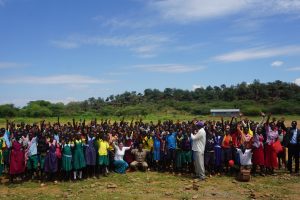
We appreciate all your support and prayers for these 256 beautiful children – let us all help bring peace to their community!
Want to see more photos? Check out my Flickr Album!
Posted By Colleen Denny
Posted Jul 3rd, 2018


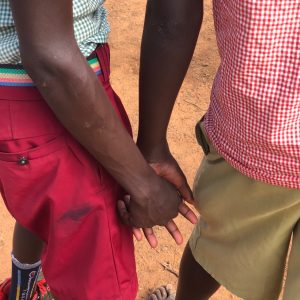
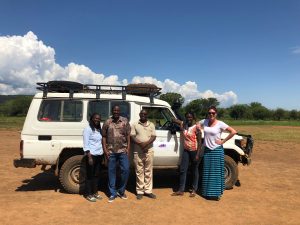
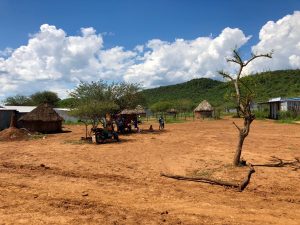
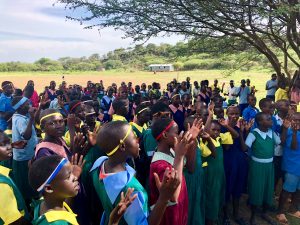
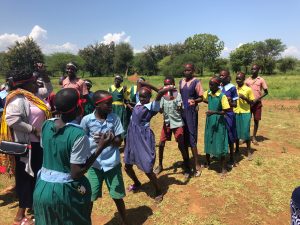
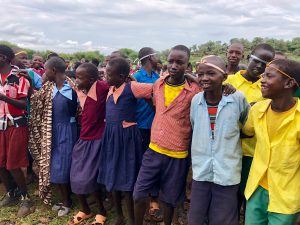
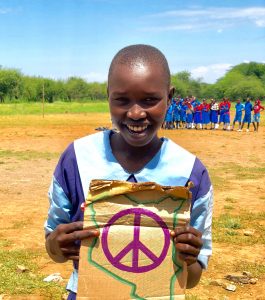
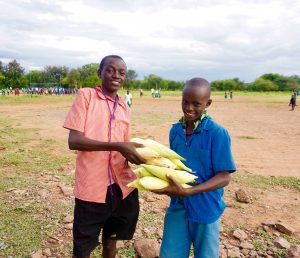
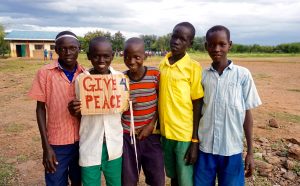
16 Comments
Corinne Cummings
July 3, 2018
Wow, Colleen. Where do I begin? Your account was incredibly thorough. Thank you for taking the time to write all this information out, and additionally, you provided so much vivid detail for the reader. I love the metaphor of the hummingbird; it generated a beautiful sentiment for the rest of your posting. Beginning to end. The work you are doing is inspiring in many ways, and the manner in which you deliver your accounts, in a storytelling fashion, makes your adventures come even more to life. I love CPI’s mission and honestly, you could not be more perfect for the job to work in tandem with their efforts. I appreciate the awesome pictures you also posted–the kids are beautiful inside and out. Keep it up out there, Colleen. I am rooting for you all!
Best wishes, Corinne
Colleen Denny
July 5, 2018
Thank you Corinne! We appreciate all of AP’s support!
Ali West
July 3, 2018
Colleen, this post made my day. I genuinely loved learning more about the great work you are doing. Your pictures and videos were incredible and it seems like great progress is being made. Awesome job!
Colleen Denny
July 5, 2018
Thank you Ali!!
Samantha Givens
July 3, 2018
Colleen, this was beautiful. I especially resonate with the road to peace not being smooth. We must all be hummingbirds and “do our best”. This blog is touching in so many ways, first with the multiple challenges you and the team faced on the way to Peace camp. The, multiple calls from worried parents, which eventually stopped because there was confidence that positive relationship building was in process. THEN, the multiple friendships that arose with the kids of different tribes. Sheila’s story is powerful to me because she demonstrates the utmost courage and drive to build peace and look for the good in people. Thank you so these refreshing lessons.
Colleen Denny
July 5, 2018
Thank you Sam! These kids are amazing!
Princia Vas
July 3, 2018
What an adventurous start to the Peace Camp and as you said the journey to peace is never easy. Your entire experience and journey of getting to the Peace Camp came alive through this blog post so thank you for that! I also really liked the hummingbird reference in the post. Keep up the good work and I really look forward to learning more about your journey in promoting peace 🙂
Colleen Denny
July 5, 2018
Thank you Princia!
iain
July 5, 2018
There’s a lot of amazing detail and great content in this blog! I’m struck by how difficult it is for families on both sides of a distrustful relationship to actually break the mold and reach out to the other side. It takes courage! Here’s the real question about peace camps. How can these children sustain their warm feelings for each other once they return home – and how does this create a lasting bond and solid bridge between whole communities? We need to show this. I’ll be looking for answers in your remaining blogs!
Colleen Denny
July 9, 2018
Thank you Iain! I agree with your comments, and anticipate that this coming week will be very enlightening to me, as I meet with beneficiary families from the Heifers for Peace program!
Cheri Behe
July 5, 2018
Hummingbirds UNITE! Wonderful project! Please keep me posted. So thankful you are involved in teaching and showing what peace is all about, “…love thy neighbor as thyself”!!! I will be honored to carry water alongside the other hummingbirds, on the 18th!
Colleen Denny
July 9, 2018
Thank you Aunt Cheri! Your support means so much! xoxo
Jane Wanjiru Kinyua
July 6, 2018
Colleen! Your narration created a mental picture of your journey and i could feel your resilience and courage…the faint hearted cannot make it! Thank you so much for taking is along through space and time. With your permission, I will your blog with my school and my mentor too. Looking forward for more…Asante sana!
Colleen Denny
July 9, 2018
Thank you for your kind words Jane! Yes please share with as many people as you’d like – anything you think that would help spread the good word of CPI Kenya!
Donna J Olson
July 9, 2018
Colleen,
Thank you so much for sharing your experience with all of us! I started to tear up when you mentioned how quickly some of the children began to make friends from the other tribe. You have a gift for describing your experiences, can’t wait to read more!
Colleen Denny
July 10, 2018
Thank you Donna!